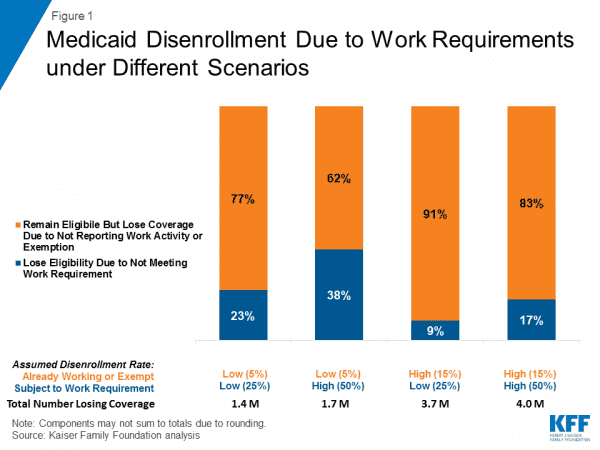
A federal judge blocked Kentucky’s Medicaid work requirements on Friday, ruling that the Trump administration did not adequately consider before approving the state’s proposal whether work requirements would violate the program’s purpose of providing health care to the most vulnerable Americans.
The court decision is at least a temporary blow to the ambitious plans of Republican-led states and the Trump administration to remake the program.
The ruling came in a lawsuit involving Kentucky, one of the first states to have its proposal requiring certain Medicaid recipients to work (or else lose their benefits) approved by the Trump administration. District court Judge James Boasberg, an Obama appointee, came down in favor of the plaintiffs, led by the National Health Law Program and Kentucky Equal Justice Center, who sought to block the work requirements from taking effect on July 1 as planned.
The federal government is obligated under federal law to consider whether a Medicaid proposal advances the program’s objectives, the judge wrote, and the Trump administration failed to meet that standard before approving Kentucky’s plan.
“The Secretary never adequately considered whether Kentucky HEALTH would in fact help the state furnish medical assistance to its citizens, a central objective of Medicaid, Boasberg said in his decision. “This signal omission renders his determination arbitrary and capricious.”
The ruling puts the future of Medicaid work requirements in doubt. The Trump administration has made them a priority, encouraging states to put forward proposals that require many nondisabled, nonelderly adults to work or look for employment. If they fail to meet these requirements, they could lose their health insurance.
Four states — Kentucky, Indiana, Arkansas, and New Hampshire — have had their work requirements approved by the administration. Seven others — Arizona, Kansas, Maine, Mississippi, Ohio, Utah, and Wisconsin — have proposals waiting for approval by the federal government.
Friday’s court decision is unlikely to be the end of the matter, as the ruling is expected to be appealed. But at the very least, it should delay the implementation of work requirements in Kentucky.
The underlying case hinges on a pretty simple argument: Does requiring Medicaid recipients to work to receive benefits further the program’s goals? Many advocates, who argue that Medicaid is first and foremost a health insurance program, believe that work requirements are contrary to Medicaid’s purpose if they cut people’s access to health care.
The state of Kentucky and the Trump administration obviously feel differently. They argue that requiring work should improve Medicaid recipients’ economic station and therefore their health — in spite of evidence that most Medicaid recipients already work or would not be expected to work. And those who do work could still lose their coverage because the work requirements are not structured in a way that reflects the realities of low-income work, like irregular or seasonal hours.
The Kaiser Family Foundation has estimated that 1.4 million to 4 million Americans — out of about 70 million covered by Medicaid — could lose their coverage if work requirements were imposed nationwide. The vast majority of the coverage losses would result from enrollees failing to report their compliance to the state, not because they were failing to fulfill the work or job search criteria.

In his ruling, Boasberg specifically chastised the Trump administration for failing to consider Kentucky’s own internal estimate that as many as 95,000 people could lose their Medicaid coverage within the first five years after Medicaid work requirements took effect.
“At bottom, the record shows that 95,000 people would lose Medicaid coverage, and yet the Secretary paid no attention to that deprivation. Nor did he address how Kentucky HEALTH would otherwise help “furnish … medical assistance,’” the judge wrote. “In other words, he glossed over ‘the impact of the state’s project’ on the individuals whom Medicaid ‘was enacted to protect.’”
Kentucky has notably raised the stakes in its lawsuit. Not only is it trying to institute work requirements, but the state is threatening that, if the court blocks it from putting these rules in place, it will end Medicaid expansion entirely. The roughly 400,000 people covered by the expansion of Medicaid under Obamacare in this state would lose their insurance.
According to several people who were present during the oral arguments, Kentucky’s lawyer attempted to paint a dire scene: If the judge rules against work requirements, Medicaid expansion would quickly end. That isn’t actually true, but the desired effect was clear. “Blackmail much?” one person who was there told me.
If you look at the text of Kentucky Gov. Matt Bevin’s executive order that set up this Catch-22, it’s a bit more complicated. The order says that the Medicaid expansion must end only when three conditions are met:
- Any part of Kentucky’s Medicaid work requirement waiver is invalidated by a court.
- All judicial appeals have been exhausted.
- Six months have passed.
vox-mark
VoxCare
Subscribe
By signing up, you agree to our Privacy Policy and European users agree to the data transfer policy.
For more newsletters, check out our newsletters page.
Adding to the confusion, Bevin didn’t even really need to issue that executive order. He could end Medicaid expansion any time he wants.
”It was just a threat to the judge,” Joan Alker of Georgetown University’s Center for Children and Families told me. “He could terminate the waiver and expansion with six months’ notice.”
But the through line here is clear: Bevin is trying to take Medicaid expansion hostage, arguing that if Kentucky isn’t allowed to impose a work requirement, then there will be no more expansion. By the Bevin administration’s logic, work requirements do advance the goals of Medicaid, because without them, Kentucky is going to end its expansion and hundreds of thousands of the state’s most vulnerable citizens will lose their insurance.
But even if Bevin is willing to follow through on his threat, the story isn’t likely to be over.
”If he tries to end coverage, there will be massive political backlash and much litigation under various theories to slow him down,” Sara Rosenbaum, a health law professor at George Washington University, told me. “Lots of potential legal arguments, beginning with the fact that they would need to redetermine eligibility under traditional rules for every single enrollee.”
The district court’s decision is probably just the first blow in a protracted legal battle. But it is a win for health care advocates who believe that requiring people to work to receive Medicaid violates the program’s principles.
Sourse: vox.com






